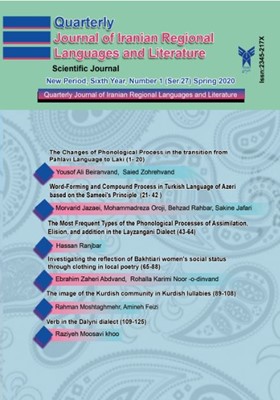Word-Forming and Compound Process in Turkish Language of Azeri based on the Sameei's Principle
Subject Areas : azari (turkish) language and literatureMorvarid Jazaei 1 , Mohammadreza Oroji 2 , Behzad Rahbar 3 , Sakine Jafari 4
1 - Ph.D Candidate of Linguistics Department, Zanjan Branch, Islamic Azad University, Zanjan, Iran.
2 - Assistant Professor of general Linguistics Department, Zanjan Branch, Islamic Azad University, Zanjan, Iran.
3 - Assistant Professor of Linguistics Department, َ Allameh Tabataba'i university, Tehran, Iran.
4 - Assistant Professor of Linguistics Department, Zanjan Branch, Islamic Azad University, Zanjan, Iran.
Keywords: Morphology, word-formation, Azeri Turkish, Compounding,
Abstract :
The study intended to analyze the general methods of common word-forming in Azerbaijani Turkish language. The aim was to reach this purpose by examining the construction of compound Azeri Turkish words. Sameei (2016) did a comprehensive study on word-forming process in Farsi, which was the inspiration source of this study for Azeri language word-forming. Numerous scholars had conducted various studies about this issue in different languages; however, Sameei's (2016) point of view and his application of variables like 'x' and 'y' were really attractive and considerable, although the absence of such study was quite visible to the Turkish language. Accordingly, this study considered 'x'(s) and 'y'(s) to represent the components of the compound words collected from reliable Turkish bilingual or monolingual dictionaries. Different patterns were introduced to show the structures of the recognized compound words. The compound words were assessed by the process, and also they were contrasted considering their syntactical chain, as Sameei did. Of course, the structural differences between the Turkish and Farsi languages were considered, and words structure were successfully analyzed with their components via the desired variables. The researcher hoped the results of the study would be applicable to wide ranges of audiences, from interested people to people who work for media and those who are active in teaching, education, and cultural areas and also would define compounding and word-forming process in this language on the basis of Sameei's (2016) viewpoint.
کتابها
- حق پرست قراملکی، حسین، (1385)، تحلیل زبان ترکی آذربایجانی به طریق ریاضی، تهران: اندیشه آریا.
- زارع شاهمرسی، پرویز، (1387)، فرهنگ ترکی – فارسی شاهمرسی، تبریز: اختر.
- زارع شاهمرسی، پرویز، (1388)، فرهنگ فارسی – ترکی شاهمرسی، تبریز: اختر.
- سامعی، حسین، (1395)، واژه سازی در زبان فارسی، تهران: بهار.
- کلباسی، ایران، (1373)، ساختار اشتقاقی فارسی امروز، تهران: موسسه چاپ و نشر رهروان فرهنگ.
- هادی، اسماعیل، (1376)، ترکی هنر است، تبریز: اختر.
مجلات
- آرام، یوسف، (1387)، «بررسی فرایند اشتقاق در زبان ترکی آذری»، پژوهش های علوم انسانی، س9، ش24، صص 185 – 207.
- امینی، رضا، (1393)، «دوگان سازی در زبان ترکی»، جستارهای زبانی، دورۀ 5، ش3، صص 27 – 55.
- بهرامی خورشید، سحر، (1394)، «کارآیی انگاره صرف واژگانی»، جستارهای زبانی، دورۀ 6، ش6، صص 47-73.
منابع لاتین
- Ahanov, K. (2013). Dil bilimin asasları. Ankara: TDK.
- Alibekiroğlu, S. (2017). Türkçede Sözlük Türetme Yollar. Dergi Park, 35-46.
- Arısoy, E. Saraçlar, M. (2017). Turkish Speech Recognition. Theory and Applications of Natural Language Processing, 93-114.
- Dressler, U. W. (1987). 'Morphological Islands: Constraint or Preference?', in R. Steele and T. Treadgold, Language Topics. Halliday. Amsterdam: Benjamins.
- Ergin, M. (1994). Türk dili. Istanbul: Bayrak.
- Ergin, M. (2009). Türk dil bilgisi. Istanbul: Bayrak.
- Eker, S. (2013). Çağdaş Türk dili. Ankara: Grafiker Yayın.
- Hacieminoğlu, N. (1991). Türk dilinde yaıp bakımından fiiller. Ankara: Kültür Bakanlığı Yayınlar.
- Jackendoff, R. (2002). Foundations of knowledge. Oxford: Oxford University Press.
- Kara, M. (2011). Ayri düşmüş kelimeler. Ankara: Bayrak Matbaası.
- Karaağaç, G. (2012). Türkçenin dil bilgisi. Ankara: Akçağ.
- Mahdixan, M (1960). A Persian Guide to the Turkish Language, London: E. J. W. Gibb Memorial.
- Menges, K. (1994). An Introduction to Turkic Studies. The Turkic languages and peoples. Washington Depot, Conn. Vol, 24. pp, 107 - 168.
- Oflazer, K. (2017). Morphological Processing for Turkish. Theory and Applications of Natural Language Processing, 21-52.
- Oflazer, K. Saraçlar, M. (2018b). Turkish and Its Challenges for Language and Speech Processing. Theory and Application of Natural Language Processing, 1-19.
- Pinker, S. (1999). Words and rules - the ingredients of language. New York: Basic Books.
- Tekin, T. (1967). A grammar of Orkhon Turkic. Netherlands: Indiana University.
- Vardar, B. (2002). Açklamalı Dilbilim Terimleri Sözlüğü, Istanbul: Multilingual
- Yeniterzi, R. Tür, G. Oflazer, K. (2017). Turkish Named-Entity Recognition. Theory and Application of Natural Language Processing, 115-132.
_||_

